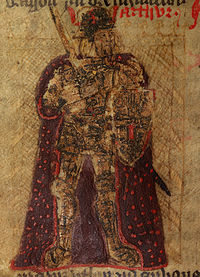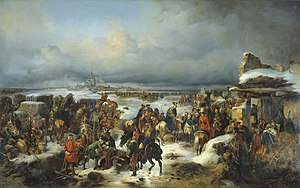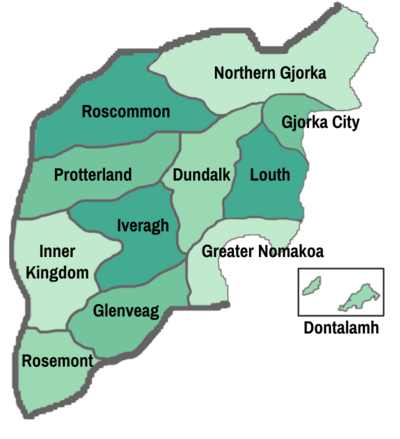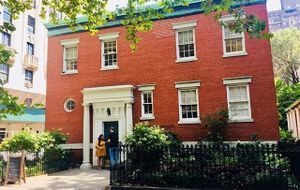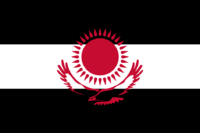Gjorka
Federation of Gjorka Cónaidhm Gjorka | |
|---|---|
Motto: "Le fírinne déanaimid iarracht, le bród" Jackian: "In truth we seek, in pride we take" | |
  Location of Gjorka in the World Location of Gjorka in the World | |
| Capital | Gjorka City |
| Largest city | Nomakoa |
| Official languages | |
| Regional and minority languages |
|
| Ethnic groups |
|
| Demonym(s) | Gjorkan |
| Government | Federal Presidential Constitutional Republic |
| Carter Morris (GA) | |
| John Burreaux (GA) | |
| Legislature | National Assembly |
| Establishment | |
| 640 A.D. | |
| 950 A.D. | |
| June 1601 | |
| 8 August 1770 - 27 September 1775 | |
| 27 September 1775 | |
| 23 May 1911 – 11 November 1919 | |
| 11 November 1919 | |
| 2 September 1971 - 11 November 1972 | |
| 11 November 1972 | |
| 7 May 1991 | |
| Area | |
• Total | 910,789 sq mi (2,358,930 km2) |
| Population | |
• 2020 estimate | 70,410,005 |
• 2015 census | 68,890,102 |
| GDP (nominal) | 2020 estimate |
• Total | $ 3.2 Trillion |
• Per capita | $ 45,559 |
| HDI | very high |
| Currency | Pón (₱) (GJP) |
| Time zone | GST |
| Date format | mm/dd/yyyy |
| Driving side | right |
| Calling code | +604 |
| Internet TLD | .gj |
Gjorka, officially the Federation of Gjorka (Gjorkan: Cónaidhm Gjorka), is a country located in south-eastern Ostlandet. Gjorka borders the Almanople Sea to the east, Zloveshchiy to the north, Uulgadzar to the north-west, Ajakanistan to the west, and New Gandor to the south. The Federation spans a combined area of 910,789 sq mi and a total population of 70.2 Million (as of September 2020). Gjorka is a Federal Presidential Constitutional Republic with its capital in Gjorka City, the country's second-largest city behind Nomakoa. Other major urban areas include Baltimore, Éire, and Rusynia.
Gjorka has existed as a unified nation state several times since 623 A.D when the First Kingdom of Gjorka was founded. Gjorka has remained unified since 1601 A.D with the founding of the Third Kingdom of Gjorka. The Third Kingdom was dissolved in 1775 following the First Gjorkan Civil War with the establishment of the First Gjorkan Republic. The First Republic began as a parliamentary democracy but in 1850 it was overthrown in a self-coup by the by the High Court of Gjorka. The High Court ruled Gjorka in an oligarchical dictatorship until 1919 when it surrendered to Revolutionaries during the Second Gjorkan Civil War. The Revolutionaries would form a military dictatorship known as the Second Gjorkan Republic the lasted from 1919-1972. This dictatorship was overthrown in the Black Revolution and replaced by a democratic government, the Third Gjorkan Republic. The Third Republic lasted from 1972 to 1991 when it dissolved due to corruption scandals regarding President Rick Milhous in favor of a new constitution with less presidential powers. This new constitution created the Federation of Gjorka, the current ruling government in Gjorka.
A developed country, Gjorka ranks as the 6th highest country by nominal GDP and 5th highest country by GDP per capita. Gjorkans high rates of economic freedom and freedom of the press. As well Gjorka is the 8th highest country by Human Development Index. Gjorka is a founding member of the Terraconserva Council of Nations and the Ostlandet Union.
Contents
Etymology
The name "Gjorka" is a holdover word from Old Gjorkan and translates approximately to "green castle". The name is a combination of the Old Gjorkan words of gjolber (meaning green) and "kala" (meaning castle). Historians believe Gjorka originated as the name for the original settlement of Gjorka City, settled by one of Gjorka's first tribes, and as the tribes expanded the name became synonymous for the area of Gjorka.
History
Early History
Gjorka history dates back to 500 B.C when the Kingdom of Gior was founded. This newly created kingdom began invading and conquering its nearby neighbors. The neighboring towns and villages began forming into defensive pacts, and confederating, which caused their neighbors to form into defensive pacts, and unite. This chain of events leads to the establishment of the Seven Kingdoms. These kingdoms were: the Kingdom of Gior, the Kingdom of Jor, the Éire Confederacy, the Nom Commune, the Dundalk Kingdom, the Kingdom of Baltimore, and the Inner Kingdom. The Seven Kingdoms existed in a near-constant state of war, and entire towns such as Dundalk were wiped off the map. This fighting was so brutal that the population was getting too low to raise soldiers. This constant state of war from the three kingdoms weakened them all severely which allowed for the neighboring Ayak Kingdom in Ajakanistan to invade and briefly conquering much of Gjorka. However, the invasion was repelled by a united Gjorkan Army led by King Ryan which repelled the invasion all the way back into near the modern day border of Ajakanistan. However, King Ryan was killed in battle, and the united army dispersed. Some Gjorkan historians theorize this period may have been entirely fabricated as one of the only known major sources of this is from the Gjorkan Folktale An Eagle Watcher. Regardless, Gjorka would enter a period of warlordism and anarchy until 400 A.D.
In 400 A.D the Inner Kingdom was refounded and began a conquest of Inner Gjorka. Following the capture of Baltimore, the Inner Kingdom began an invasion of the small towns on the coast. Despite their numerical superiority, they were unable to make any major gains. Resistance to occupation was severe, and many towns banded together in defensive pacts allowing them to defend against the armies of the Inner Kingdom. In 550 A.D, the Decree of 550 was issued. The Inner Kingdom would withdraw from all coastal territories, and in return, the coastal kingdoms would not invade the Inner Kingdom. This period with any major threat allowed the coast kingdoms to unify and stabilize. In 580 A.D, King Josias was crowned in the Kingdom of Gior. He was a military genius who in 10 years managed to unite much of the Northern Coast, and by 595 A.D he had united half of the Gjorkan Coast. However, he was met by the rapidly expanding Kingdom of Jor. The Kingdom of Jor expanded via diplomacy and intermarriage uniting and expanding their kingdom. This allowed them to produce a much larger army than that of Gior. Despite this Josias managed to win several key battles against the Jor, and seemed as if their defeat was inevitable. During the Battle of Éire River, Josias made a bold move by retreating from his left flank and using the additional troops to pacify the center. All of this hinged on his reserves making it to the battle in time to stop the advancing Jor on the left flank. Unfortunately, the reserves never arrived as their commander went off to pillage a local town. With this much of Josias's army was encircled, and death was inevitable. He however managed to escape with 1/4 of his original force and flee back to safety. Thus catastrophic defeat meant Jor numerical superiority was simply too much to overcome. The war lasted another 20 years and ended after Josias died of Cancer in 620 A.D. His son, King Wittlekind, was able to negotiate a treaty with the Kingdom of Jor. The two states unified into the Kingdom of Gjorka. Since the Decree of 550, the Inner Kingdom had been stagnant. Their armies had been reduced drastically, and the economy hadn't been growing for years. The First Unification War was a swift one. In one year, the Inner Kingdom was defeated. For the first time, Gjorka was united.
Middle History
The First Kingdom of Gjorka was met with many troubles when it was first formed. Many of the People of Gjorka didn't have an attachment to one another. Policing the former lands of the Inner Kingdom was incredibly hard, and bandit raids were frequent in the area. The structure of the Kingdom allowed local dukes to raise their own troops, and they would frequently go to war with one another. The subsequent kings of Gjorka were paid massive bribes by these dukes to keep the structure in place. This system of near-constant wars with dukes created a constant state of warfare within the kingdom. The population was reduced by a significant amount, and food supplies began running low as men to farm the fields were used for petty squabbles between kings. In 720 A.D the Nom Commune declared independence from the Gjorkan Kingdom, and soon several more kingdoms followed. The Kingdom was reduced to ruins and by 725 A.D the First Kingdom of Gjorka had fallen. However during the first Kingdom's rule, Gjorka's merchant trade with the outside world exploded. This included with the early kings of Paleocacher whom were a major trading hub. Paleocacher Merchants held high standing in Gjorkan society, and thus many in the Gjorkan Royalty and Merchants learned to speak Old Cantuath. Before this, a variety of dialects of Old Gjorkan was spoken with some having incredibly different linguistic rules. However, after this Cantuath slowly spread from the royalty and merchants to the masses and became the dominant language eventually morphing into modern Gjorkan.
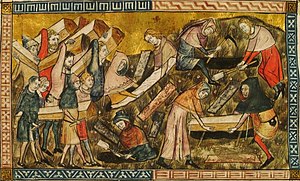
What followed was a period of constant fracturing with small kingdoms rising but collapsing due to instability. Food Reserves remained depleted, and famines were the frequent cause of rebellions. A famine occurred in 730 which descended much of the region into chaos. A period piece near the 850s allowed for food reserves to rise, and agriculture to stabilize in the country. Subsequently, three kingdoms rose, the Inner Kingdom, the Second Kingdom of Gjorka, and the Éire Confederacy. By the 950 A.D, the Second Kingdom of Gjorka had once again secured control of the country. This time the Kingdom was more federalized and had great stability. The Kingdom stood strong for nearly 600 years until 1350 A.D. when a major hurricane struck the city of Gior and destroyed it. The king and most of the royal family were likely killed in the storm, and the government across the country was destroyed. Gjorka once again descended into a period of anarchy. In this time around the 1420s, it is believed survivors from Gior founded a town in what is now modern-day Gjorka City. It was ruled by a rump state claiming to still be the Second Kingdom of Gjorka.
In this rump state, a massive rebellion broke out, and leading to the death of the king. One of his knights, Brian MacGuire, arrived at the capital with the majority of the army and was able to put down the rebellion. With no one else to rule, Brian crowned himself Brian I of Gjorka, King of Gjorka. This announcement was met with severe blowback from the various lords he now ruled over and the kingdom once again shrank. In an attempt to secure his legitimacy he founded Gjorka City. Over the next several hundred years his successors began the slow process of reclaiming Gjorka, and by 1601 the city of Nomakoa was captured by the kingdom and where historians agree is the start of the Third Kingdom of Gjorka.
The Third Kingdom of Gjorka entered the 1700s in a prosperous state, and for the most part, the kingdom was stable. Gjorkan merchant trips traveled around the world selling goods and the like. This created a wealthy merchant in the main port cities of Nomakoa and Gjorka City. However, the residence of the king had been moved into the countryside to Bloemfontein. This created a disconnect between the rich merchant classes and the ruling aristocracy. Many in the aristocracy resented the merchants as few were of noble lineage. However, the merchants operated under relative autonomy as the King and his court were worried about other matters. However, in 1769, a great flood destroyed much of Bloemfontein. The Royal Palace was destroyed in its entirety. The King, Quintin III escaped to the safety of his capital, Gjorka City. In order to rebuild his grand palace, he increased taxes heavily on the merchant class. Yet, this tax was barely enforced as the Merchants were entrenched so deeply in the Government of the city. Most tax collectors accepted generous bribes from the Merchants rather than collect the taxes. This enraged the king who raised the Royal Army and attempted to take control over the city. The merchant class repelled the attempt, and the King was forced to flee. The Merchants proclaimed the Proclamation of the Free in response. The proclamation accused the king of putting his interests over that of the country. and for committing treason against the kingdom. They declared his rule no longer legitimate and decreed a new government be installed in his place. Both sides rallied forces to their cause and thus began the First Gjorkan Civil War. The war lasted for 5 years and resulted in 140,000 thousand in total between both sides. Over 100,000 died due to disease. However, the Merchant forces emerged victorious and declared the First Gjorkan Republic with its capital in Nomakoa.
Late History
The new republic created a dual government. On one side was the Legislature who were elected by the people (mostly the wealthy merchants). The legislature then elected a presider who, presided over the legislature and acted as the head of state. The second part of the government was the Judicial System, which lead all the way up to the High Court of Gjorka. This court was composed of 5 judges who acted as the counterbalance to the often radical legislature. Each Judge was appointed by the Governor of the Province they represented. However, every Judge appointed in the court's history was a wealthy merchant. This new merchant dominated republic was extremely unstable and the flaws in it were quick to point themselves out. As more and more commoners were elected to the Legislature, the merchant class grew wearier of them. They began demanding things such as access to the High Court, and reduced taxes which were unfairly burdened on them. In the Election of 1835 a commoner party secured a plurality of seats for the first time. The merchant parties in fear of allowing a commoner to secure the Presidership banded together and elected a joint candidate to be presider. This caused the multi party system to fade as the National Party, which was pro-merchant, and the Gjorkan Party, which was a commoner party, were the only parties with a shot of contending for the presidership. In the heavily contested Election of 1850 the Gjorkan Party was able to secure the majority by one seat. As a commoner was elected to be the Presider for the first time there was much doubt in the nation. The High Court of Gjorka had been mostly hands off in government affairs due to a friendly legislature, but with the success of the Gjorkan Party they began to take action. Acting quickly the High Court found the Gjorkan Party to be a treasonous organization, and promptly ordered the arrest of all know members. Next they dismissed the entire legislature on the grounds they had treasonous members within their ranks, and suspended the next election indefinitely. Finally the ordered the capitol to the be locked down, and no news allowed out of it. This prevented escape of many Gjorkan Party officials, and bought time for the military toe establish control in the rest of the country. In three swings of the gavel, Gjorka was ruled by a dictatorship of the High Court.
This oligarchy remained intact for 60 years until the Blue Revolution. The Blue Revolution was a series of protests against the court witch eventually erupted into full scale fighting in the streets. The protesters, who often wore a blue flag to symbolize democracy, were able to secure control of Gjorka City. This revolution eventually erupted into the Second Gjorkan Civil War between the Blue Revolutionaries and Government Forces. The war lasted 8 years and was devastating to Gjorka with much of the young male population wiped out. The Blue Revolutionaries emerged victorious, but under very different leadership. Many of the army commanders in the war rose to political positions. These commanders set up a Military Dictatorship after the war as the of the Second Gjorkan Republic. The First President was Éamon de Valera who ruled for twenty years until his assassination in 1932. He was succeeded by his wife, Ciara de Valera, who was Second President and ruled until she removed from power in 1949. Following the tenures of Eli Mannion and Caelan MacRory, the Dictatorship lacked a clear successor to MacRory after death in 1971. His cabinet members attempted to negotiate succession, however they were outmaneuvered by a young military commander named Austin Tannerburg. Using his small military force he was able to secure the capitol. He was then promptly declared the next President. However, he failed to secure the support of much of the military and many generals opposed his sudden rise to President. Mobilizations began, and many feared the country was on the brink of a third civil war. With few allies, Tannerburg was forced to ally himself with underground democracy movements to counter the strength of the military. Making a public address, he said he would restore democracy to Gjorka. Crowds flooded the streets in joy, and celebrations were held around the nation. Facing mass desertions the several factions against Tannerburg disbanded. This event would come to be known as the Black Revolution A year later on November 11th 1972, exactly 53 years after the end of the Second Gjorkan Civil War, the Third Gjorkan Republic was declared, and a democratic constitution was ratified.
Modern History
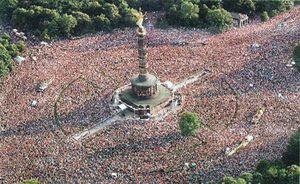
The first president elected was Samuel MacMorrow who helped establish the power of the Presidency and created the dynamic between the National Assembly and the President. His administration was instrumental in the survival of the young democracy by setting up the bureaucracy of the Gjorkan government, privatising several companies, and rebuilding Gjorka's infrastructure. He served two terms as president, but decided not to run for a third due to a stroke he suffered near the end of his second term. He was succeeded by Rick Milhous in 1982. The Milhous administration reversed many of MacMorrow's policies, and exploited the weak nature of the constitution. Using the power given to the president by MacMorrow he was able to seize several major companies in Gjorka and replaced their leaders with allies. His administration embezzled millions of public dollars and resulted in a major economic downturn for the republic. Following his narrow re-election in the 1987 Election, he was met with multiple ballot stuffing and election rigging allegations. These allegations did not bear fruit until 1988 when the landmark report from the Gjorka Times was released with testimony from numerous sources within the administration detailing various crimes such as embezzling public funds, bribing election officials, and forging of economic reports along with others. This report sparked massive public outrage and widespread protests know as the Pink Revolution. An investigation was launched by the National Assembly and after finding proof behind the report's claims. Eventually the National Assembly voted to impeach President Milhous and Vice President Theodore Ford for their involvement in various crimes. The National Assembly officially named Leslie King to be the interim president for the remainder of Milhous's term. However, the public was outraged at the actions of Milhous and there were protests throughout calling for a new constitution with less presidential powers. Initially, the Assembly was only going to amend the current constitution but after continued public backlash, a constitutional convention was formed. The final draft of the constitution included a much weakened president. a maximum of two presidential terms and required National Assembly approval on most presidential decisions. Gjorkan voters approved the new constitution in referendum and on May 7th, 1991 the Federation of Gjorka was declared, and a few months later Wilson Aldrich was elected the first President of the Federation.
Aldrich's administration was fraught with conflicts over presidential power. The National Assembly used their new power extensively demanding approval for almost any action the President took. The country was politically a mess, and a record low of legislation was passed. This caused the 1st Amendment to the constitution to be passed. It detailed more in depthly what actions the National Assembly had to give approval for, namely most foreign policy decisions, and controversially gave the President a veto on legislation passed. as well during this time the Gjorkan Economy slowly began to recover from the downturn it faced in the 80s. Aldrich was able to secure re-election in 1996, and with increased power enacted several presidential decrees to improve the economy. Namely one was creating the Business Investigation Committee which investigated the major companies seized by Milhous. Several major embezzlement schemes were unearthed and hundreds of millions of dollars were added back into the Gjorkan economy. This and other measures led to an economic boom in the 90s that allowed Gjorka to emerge as a major global economy. Aldrich also switched his party to the Pro-Gjorkan Initiative which led to them securing a majority in the Assembly. His previous party, Gjorka United lost their majority as a hundred of their members switched allegiances to the PGI including the Majority Leader. This in fighting between PGI and Gjorka United allowed for a new leftist party, Forward Gjorka, to take their place. In the 2001 Gjorkan presidential election, Joe Wallace won a major upset victory. Two years later, Aldrich died of natural causes and with his death PGI began a slow decline into irrelevancy.
Ben Wallace was faced with several changes as president, as his party was unable to secure a majority in the National Assembly. Initially, PGI formed a coalition with Gjorka United and allowed GU to take the majority leader position. However after the death of President Aldrich and accession of Ronn Berot to party leadership, the newly elected leader moved the party in a more leftward direction. He switched coalition partners, and allowed for Forward Gjorka to take over as majority leader. This decision was extremely controversial, and several members who left GU to join PGI under Aldrich went back to GU. The Wallace Administration was unable to pursue their ambitious goals due to their lack of majority. His administration was fraught with controversy as any bill the administration tried to pass went through intense deliberation dragging the process out for months. Despite this, he retained an average popularity leading into the 2006 Election, and was even leading in most polls. However, three months before the election the Laura Samille Scandal occurred in which it was revealed President Wallace had been having an affair with Laura Samille since 1994. However, Samille only turned 18 in 1996 which led to the President being accused of being a child predator. This scandal tanked his campaign and he was defeated soundly in 2006 by Joseph Marnell.
Joseph Marnell was the first president elected with a military background since the Military dictatorship as he was previously Supreme Marshal of the Army. He controversially raised Gjorka's military budget significantly during his tenure at the expense of public services like Education. His Secretary of Global Relations was embroiled in controversy throughout his tenure including arguing for war against Ajakanistan, and attempting to mobilize more troops to the border of Ajakanistan. The Economy under Marnell began to stagnate, bucking a 15 year trend of growth realized under the previous two presidents. Unemployment jumped 3%, and foreign companies began to leave Gjorka. Marnell in fact had the lowest approval poll of any president, polling at 2% during January of the fourth year of his presidency. He was nearly removed from office via a vote of no confidence but it was defeated 238-212, and barely managed to secure his parties nomination for president by a 1% margin. His unpopularity led many right wing members of Gjorka United to join other parties such as the National Social Party. He was handily defeated by Roman Vanderburg in the 2011 Gjorkan presidential election.
Roman Vanderburg's first term was incredibly productive and implemented several reforms such as the Universal Healthcare Act which greatly expanded insurance coverage and caused the uninsured population to crater, the legalization of gay marriage and several reforms of police around the country. During his presidency accidental shootings by police, accusations of police brutality, and protests against unfair treatment by the police have gone down significantly. He managed to secure re-election in the 2016 Gjorkan presidential election, but lost his majority in the Assembly. His second half of his term was far-less productive, and several more reforms such as an $20 minimum wage wage, end of coal use in Gjorka, and reduction of Immigration restrictions were not passed. He left office with a 54% approval rating.
Geography
Gjorka extends over 910,789 square miles which is covered with Mountains, Hills, Forests, Rivers and Lakes. Two mountain ranges, the Caha Mountain Range in central Gjorka, and the Carrauntoohil Mountain Range comprise Gjorka's mountainous areas. These two parallel mountain ranges form the Great Valley of which much of Gjorka's industry sits. Gjorka is also home to a number of rivers, most famously the River Rusynia which stretches all the way from the Cahas to the Almanople Sea. Gjorka's landscape was once famous for it's heavily forested nature, however since the Industrial Revolution Gjorka's forests have significantly shrunk in size, especially in the Great Valley.
Climate
Government and Politics
Government
The Federation of Gjorka is a Federal Presidential Republic with a unicameral legislature. The Federation has three branches of government, the executive branch represented by the President of Gjorka and their cabinet, the legislative branch consisting of the National Assembly, and the judicial branch constituted by the Supreme Federal Tribunal of Gjorka and it's lower courts. The Gjorkan Government is composed of three levels of Government: Federal, District and Local.
The Legislature of Gjorka comprises of the National Assembly which houses 450 members elected from each of Gjorka's several districts. Members are elected via an open list proportional representation voting system to be representatives from their constituency.
The Executive Branch of Gjorka is headed by the President of Gjorka, and their various cabinet members. The President acts of head of state, and head of government and commander-in chief of the Gjorkan National Armed Forces. The President enforces laws via his cabinet who head the various Departments of the Gjorkan Government.
The Judicial Branch of Gjorka constitutes the court system of Gjorka. Starting in local courts, cases are then taken to district courts where they then are presented to federal courts before finally arriving at the Supreme Federal Tribunal of Gjorka, the highest court in the land. The Supreme Tribunal is the final court of appeals for all cases constitutional, civil and criminal. For the first six months of the year, the Tribunal hears only cases regarding constitutionality, while in the final six months of the year it hears only civil and criminal cases.
Gjorka is composed of 11 Districts and one Autonomous District who have limited legal authority over their respective areas. Each district has their own senate elected by the people and a governor appointed by the ruling president (with approval from the district senates) for 10 years, except for Dontalamh where the Governor is elected by the District Assembly. However, Federal Law is supreme, and in practice laws don't differ widely from district to district.
Politics
Gjorka has operated under a weak two-party or multi-party system since the end of the military dictatorship. The federation has only seen three parties in power: the Pro-Gjorkan Initiative, Gjorka United, and Forward Gjorka. However, the countries other parties have had also had large influence on government and been crucial to forming a governing coalition such as the Green Party.
Currently, the right side of the political spectrum is represented in the National Assembly by the conservative Gjorka United, right-wing populist National Social Party and the libertarian Freedom Party. The left side is split between Forward Gjorka and the Green Party. The syncretic Gjorkan Pirate Party is also represented.
Foreign Relations
The Foreign Relations of Gjorka is directed by the President, approved by the National Assembly, and managed by the Department of Global Relations. Gjorka has historically been known for abstentionist policy in global politics during the Third Republic and early Federation. Nearly all of the President's foreign policy actions were under the scrutiny of the National Assembly and thus many presidents choose neutrality over conflict with the legislature. Until 2014 all votes by the Gjorka at the Terraconserva Council of Nations via the Permanent Mission of Gjorka to Terraconserva Council of Nations had to be approved by the Assembly. Long debates times meant Gjorka was forced to abstain much of the time due to lack of Government decision. Since 2014 the National Assembly has delegated more power to the President, leading to Gjorka becoming much more active in global policy. In 2022, Gjorka founded the Ostlandet Union at the 2022 Gjorka City summit and as well signed a mutual defense treaty with New Gandor.
The Gjorkan Constitution maintains the President can bypass the Assembly's approval for foreign policy matter if the matter requires immediate response, or if the country is in a state of war. However, if this power is not used appropriately it is grounds for impeachment.
Military
Gjorka is protected by the Gjorkan National Armed Forces which is composed of the Gjorkan Ground Forces, the Gjorkan Naval Forces, the Gjorkan Aerial Forces, and the Gjorkan Special Forces. The Military is overseen by the President acting as the National Defender of Gjorka and managed by the Department of Armed Defense. The Department oversees all 4 branches of the Armed Forces and the Gjorkan Coastal Patrol. 176,890 soldiers currently comprises the active duty personnel while the country also maintains a large pool of reservists at 678,900 currently.
The Gjorkan Military maintains a small but well-equipped and highly trained armed force. Being an active member of the armed force is considered a highly prestigious honor, and requires years of rigorous training. Of the branches of the armed forces, the Gjorkan Special Forces has the most prestige with it's members being only selected from highly skilled and decorated members. This currently military mindset was adopted in 2012 following Roman Vanderburg's assumption to the presidency.
Economy
Energy
Gjorkan energy consumption by Fuel in 2021
Gjorka consumes annually 401,345 gigawatt hours (GW·h/yr) which is primarily sourced from Hydroelectricity and Coal which combined make up 52.5% of all energy consumed. Renewable energies like Solar and Wind only make up 18.5% of energy consumption, although there has been a considerable push politically increase that number. Gjorka's coal usage has also gone done significantly from when it made up 40.2% of energy consumption in 2000 to it's current status of 23.9%, with political parties like Forward Gjorka and the Green Party advocating for Gjorka to ban coal use in the near future.
Manufacturing
Sea Trade
Transport
Gjorka is home to number of airports, with its two largest being MacMorrow International Airport and Greater Nomakoa International Airport. The flag carrier of Gjorka is Aer Gjorka which is also Gjorka's largest airline followed closely by Spéir.
Demographics
Religion
Religion in Gjorka from the 2020 Census
The Gjorkan Constitution guarantees Religious Freedom to all Gjorkan Citizens.
Gjorka has one of the highest irreligious rates in the world, with 58% of the country saying they believe in no god or higher power. The next largest religion is christianity with 30% of Gjorkans saying they believe in some form of Christianity. Of that 30%, 20% believe in some form of Protestantism with the other 10% believing in Catholicism. After that is Druidism, a religion native to Gjorka, which 6% of Gjorkans say they believe in. The remaining religions don't go above 1% with the exception of Islam which 1.2% of Gjorkans follow.
Gjorka's high irreligious rate began mainly during the First Republic, when the government actively discouraged Gjorka's predominant religion, Druidism, as it was seen as a representation of the overthrown monarchy. This irreligiousity became cemented during the Second Republic, when Gjorka was declared an atheist state and all religion was discouraged.
Languages
Gjorkan is listed in the Constitution as the official and primary language of Gjorka. It is spoken as a first language by 97% of Gjorkans. The government of Gjorka used Gjorkan solely for nearly all public releases as well as for public services such as road signs. The only exception to this is in the autonomous district of Dontalamh where Gjorkan and native Akaroan are co-official languages. The second largest spoken native language in Gjorka is Khoroshiyan Slavic which is the primary language of the Khoroshiyan minority group. Due to the Gjorkan government's policy of discrimination against Khoroshiyans, Khoroshiyan Slavic is not recognized as a minority language.
Gjorkans on average speak at least one other language as the Gjorkan Education System mandates every student must be taught at least one other language with the five most popular in order being: Creeperian, Arabic, Lyoan, Ajaki, and Quebecshirite.
Healthcare
Education
Culture
Sports
Gjorka has leagues for a variety of sports, most popular is the Gold League, and the Gjorkan Peil League. Peil is the more popular of the two, but Football has been increasing in popularity for years.
Public Holidays
See also


